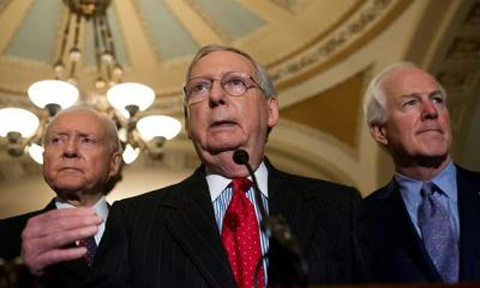WASHINGTON, Dec 2, 2017 (BSS/AFP) – Donald Trump’s sweeping tax reform plan inched toward final passage in the US Senate Friday, potentially becoming a major legislative victory for the president after overcoming resistance from Republicans concerned about its high cost.
“We have the votes,” Senate Majority Leader Mitch McConnell told reporters as he entered the chamber.
The count represents a major boost for Republicans just 24 hours after momentum to pass the tax code overhaul stalled when a handful of deficit hawks balked at the controversial plan’s $1.5 trillion price tag.
After marathon negotiations the bill appeared on track for passage, although tax writers continued to tweak the 479-page measure late into Friday.
Trump, who has been more active in the legislation’s navigation through Congress than he was with the Obamacare repeal bill that failed earlier this year, is desperate for a congressional win.
He has repeatedly stressed he wants the tax bill on his desk by year’s end.
“Let’s finish the work we started years ago. We can’t let this moment slip by,” McConnell said, as the tax debate ground on toward a late, and perhaps overnight, vote.
Democrats fumed that they only received the text — complete with lengthy hand-written modifications that earned scorn from lawmakers — a few hours before they were expected to vote.
“We understand they have the votes to pass their bill despite a process — and a product — that no one can be proud of and everyone should be ashamed of,” top Senate Democrat Chuck Schumer told colleagues.
Haste and the darkness of night were Trump’s allies in the process, Schumer said.
– Holdouts relent –
Several Republicans who had voiced concerns about the bill were lured by McConnell’s agreement to make some changes.
Senators Bob Corker and Jeff Flake, who have been critical of Trump in recent months, were worried about the impact of the tax cuts on the country’s massive deficit, and had wanted a so-called “trigger” to automatically raise taxes if revenues fall short of projections.
But late Thursday, the Senate parliamentarian said such a mechanism did not comply with budget rules.
Last-ditch negotiations then opened over how to offset the cost of dramatic tax cuts for corporations and more modest cuts for individuals.
Corker sought to have corporate tax hikes included down the road in order to offset the costs, but the effort failed.
A nonpartisan congressional tax scorekeeper had projected the tax overhaul would add $1 trillion to the deficit, even after accounting for expected economic growth from the plan.
The analysis complicated Trump’s argument that the tax cuts, including a reduction of the corporate rate from 35 percent to 20 percent, would pay for themselves through additional economic growth.
Flake eventually agreed to back the legislation, after receiving assurances from the White House that action would soon be taken to shield from deportation hundreds of thousands of young immigrants who were illegally brought to the United States as children.
– ‘Rubik’s Cube’ –
Lawmakers said a deal was reached to raise tax deductions for certain small businesses, a move that got two more wavering senators on board.
As an offset, the bill’s tax rate for US corporations repatriating profits from abroad would rise, from 10 percent to possibly 14 percent.
“It’s like the Rubik’s Cube trying to fit everybody’s concerns in. But I think we’ve ended up with a better bill,” Senator Rob Portman said.
Republicans hold a narrow 52-48 Senate majority. With all Democrats expected to oppose the tax plan, just three Republican defectors would kill it.
Senator Susan Collins had voiced deep skepticism about the bill. But she said she managed to secure changes including on health care and local taxes, and was now in the yes camp.
That left Corker as the last Republican holdout — but his opposition is not enough to derail the tax cuts.
If the legislation passes the Senate, it still must be reconciled with the recently passed House version. The plans differ on some points.
Democrats argue that the plan is too expensive and will accommodate only the rich.
“The federal treasury is being looted tonight!” leftist Senator Bernie Sanders roared in the chamber.
Prior to a final vote, the Senate late Friday entered into a series of roll calls on amendments put forward from both parties.
One proposal being closely watched was an effort by Republicans Marco Rubio and Mike Lee to expand the popular child tax credit.
To offset that cost, they proposed dropping the corporate tax rate to 20.94 percent, instead of 20 percent in the original bill.
“With less than that one percent difference (in the corporate tax rate) we can make a huge difference in the lives of working families,” Rubio said.



